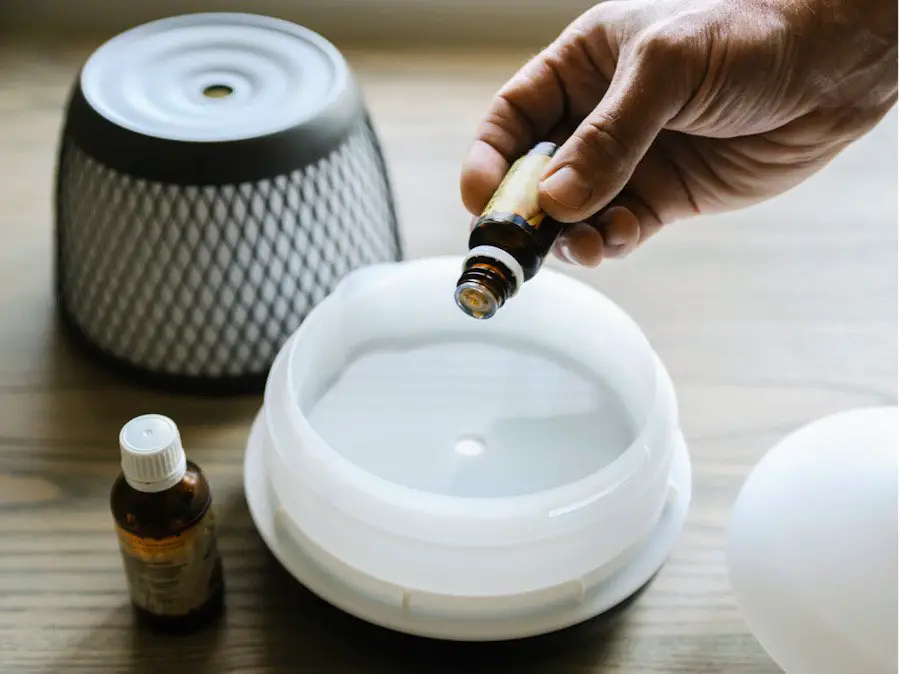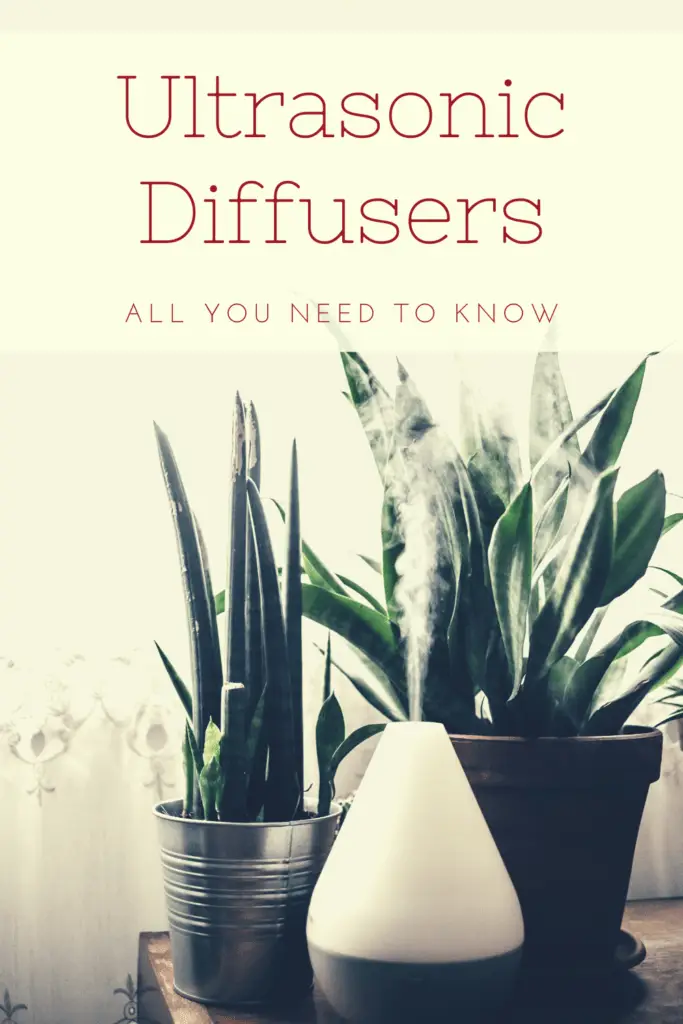Aromatherapy is a discipline on the rise which has been shown to help with many health problems, such as pain and depression. For me, one of the best tools you can use to disperse essential oils in your home is an ultrasonic aromatherapy diffuser. But what exactly is an ultrasonic aromatherapy diffuser?
An ultrasonic diffuser is a device that uses electricity to breakdown essential oils and disperses the molecules in the air. The diffuser uses water as a transference mechanism, but it does not generate steam. The oils usually sit on the water, where the diffuser’s ultrasonic vibrations agitate them. The agitation negatively charges the essential oil molecules, allowing them to attach themselves to the positively charged particles in the air.
The device releases a fine mist composed of negatively charged essential oil molecules and water in the air. Thanks to air movement, the molecules get distributed to all corners of the room.
You can check out one of my favorite ultrasonic diffusers on Amazon here.
Table of Contents
What Is the Difference Between an Ultrasonic Aromatherapy Diffuser and Nebulizing Diffuser?
While sometimes confused, an ultrasonic diffuser and a nebulizing diffuser are not the same. A nebulizing diffuser is an aromatherapy device that disperses essential oil molecules in the air as a fine mist (you can see a stylish nebulizing diffuser on Amazon here). Despite having a similar function, both devices – ultrasonic and nebulizing diffusers – differ in several ways.
First off, a nebulizing diffuser does not use water, while an ultrasonic diffuser does. Instead of water, a nebulizing diffuser uses essential oils only. It uses an air pump to create a vacuum and pull fine particles of the oil and disperse them in the room.
Second, since nebulizing diffusers do not use water, they do not have a humidifying effect like ultrasonic diffusers. Due to this, nebulizing diffusers are smaller in size compared to ultrasonic diffusers. The nebulizing diffuser’s small size allows it to disperse essential oils faster than an ultrasonic diffuser.
Because a nebulizing diffuser disperses essential oils only, it may go through more oil faster. For example, a nebulizing diffuser requires 20 to 40 drops more of essential oils for just a single session. This is unlike an ultrasonic diffuser that requires only a few drops – 10 to 20 drops.
Lastly, a nebulizing diffuser is not budget-friendly as compared to an ultrasonic diffuser. A nebulizing diffuser costs more and will require you to use more oil.
Do You Need An Ultrasonic Aromatherapy Diffuser?
If you are interested in taking full advantage of the benefits of aromatherapy, then I’d definitely recommend getting an ultrasonic diffuser.
By the way, if you are wondering whether an essential oil diffuser is a better choice than other aromatherapy solutions, such as scented candles, check out my article ‘Essential Oil Diffuser Vs. Scented Candles – Choosing the Best for You.’
Here are some of the reasons I decided to get an ultrasonic diffuser:
It Promotes Good Sleep
Are you struggling to stay asleep or fall asleep? Well, an ultrasonic aromatherapy diffuser might help. A 2014 study showed that aromatherapy is a safe alternative for helping with mild sleep problems. During the study, researchers found that essential oils have a sort of a hypnotic effect when inhaled.
When you inhale the fine mist dispersed by a diffuser, it promotes neurotransmitter activity in the brain. This results in the release of good feel hormones such as serotonin and dopamine. As such, you get to experience restful, uninterrupted sleep.
The best essential oils that promote good sleep include lavender, chamomile, jasmine, and bergamot.
If you are interested in other ways to improve your sleep, be sure to check out my article ‘How to Sleep and Wake Up Refreshed – The Ultimate Guide’.
It Keeps Your Home Smelling Fresh
In humans, there are more than 300 active olfactory receptor genes dedicated to detecting different fragrance molecules. Knowing strong aromas can affect you both positively and negatively should come as no surprise.
According to the New York State Department of Health, strong odors cause several adverse effects on your health, including headaches and dizziness. However, essential oils and an ultrasonic diffuser could help counter these effects. When you inhale essential oils, their psycho-physiological properties elevate a person’s mood.
Examples of aromatic essential oils include peppermint, rosemary, lemon, lavender, chamomile, and jasmine.
It Can Boost Your Respiratory Health
Inhaling essential oils could improve your respiratory health. Essential oils boost your immune system, respiratory tract and can help eliminate coughs and colds. In a 2018 study, researchers evaluated the antibacterial activity of selected essential oils on respiratory tract pathogens. They evaluated essential oils such as thyme, scots pine, peppermint, eucalyptus, and citronella. After carrying out tests, they discovered that thyme and clove were most effective against pathogens.
Research suggests that essential oils are effective in treating upper respiratory infections. Such infections include sinusitis, common cold, and pharyngitis. These infections cause inflammation of the respiratory tract. That’s why essential oils could help relieve the symptoms.
A 2014 study on the anti-inflammatory properties of eucalyptus revealed that it has useful properties. They include anti-inflammatory and antioxidative properties. As such, it might be beneficial in the long-term therapy in preventing COPD exacerbations and improving asthma control.
It’s always a good idea to talk to your physician before trying aromatherapy for helping with your health conditions.
It Can Help Manage Anxiety and Depression
Depression, stress, and anxiety are some of the greatest health concerns. Research shows that they affect more than 350 million worldwide. One of the most promising treatments that have proven effective against depression, stress, and anxiety is aromatherapy. An ultrasonic aromatherapy diffuser can be one of the easiest ways to take advantage of the potential benefits of aromatherapy for these issues.
A 2017 study sought to find out the effectiveness of aromatherapy for depressive symptoms. The researchers reviewed 12 randomized controlled trials for aromatherapy intervention and discovered that aromatherapy is effective for the relief of depressive symptoms.
Some good choices that could help with depressive symptoms are: valerian, jasmine, and others.
Again, make sure to check with your healthcare provider whether aromatherapy could be a good option for you!
Final Thoughts
Essential oils can bring lots of benefits to your life, including helping with stress relief, creating a pleasant environment, and improving sleep. I’ve found that an ultrasonic aroma diffuser is one of the easiest, most reliable ways to take advantage of these benefits. Enjoy!
By the way, if you are having trouble getting the aroma intensity you expect from your diffuser, check out my article ‘Why You Can’t Smell the Essential Oils in Your Diffuser and What to Do.’


